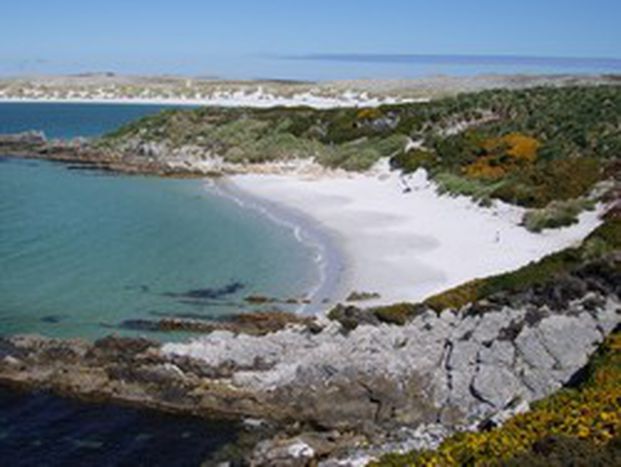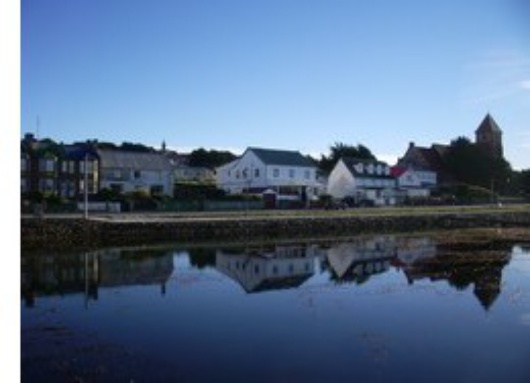
Back home in the Falklands
Published on
14 June 2007 marks twenty-five years of liberation from the Argentine military by British forces. A Falkland Islander born after the war discusses his islands' economical, European and neighbourly strides
Most Europeans (assuming that they are aware of the Falklands at all!), probably associate the Falklands with the cold stark images from the Conflict, which ended on 14 June 1982, or the territorial dispute with Argentina. But over the last twenty-five years, the Falklands have become an increasingly vibrant community with a very positive future.
Falk-who islands
The Falkland Islands are a British Overseas Territory in the South Atlantic with a population of 2955 (91% of British and dependent territory origin, as stated in the 2006 consensus). The Legislative Council has eight members. The Falklands' two constituencies have five elected members representing the capital Stanley, and three representing 'Camp' (everywhere outside of Stanley). All members stand as independents - there are no party politics in the Islands.
Many assume that the Islands are run at the expense of the British tax payer. In fact, the Islands are economically self-sufficient in all areas except defence - some 0.5% of the total UK defence budget. The Islands are self-governing, although foreign affairs and defence matters are handled by the British government. Economically, the Falklands have been transformed since the Conflict: the GDP has risen from about £5 million in 1980 to over £72 million in 2004, with revenue from fishery being the main source of income.
Falklands in Europe
As an Overseas Territories of a Member State of the European Union, the Islands are accorded certain status under the Treaty of Rome and Maastricht Treaty – effectively, unrecognised by the EU as a UK territory. We are not full EU members but are associated through the ‘Overseas Association Decision’ (taken by the European Council), which provides for duty-free access for products originating in the OCT’s. As British citizens, Falkland Islanders have complete visa free access to the EU to live and work, which is not reciprocal, and quota free access as well as duty free.
The Falklands receive access to financial support from the European Commission via two main routes. Firstly, £4.2 million has been received in funding from STABEX (Stabilisation of Export Earnings Scheme. Currently, the Falklands have withdrawn £2.5 million, leaving a balance of £1.7 million to be drawn down). Secondly, the European Development Funds (EDF, separated into regional and territorial funds), have given €700, 000 (infrastructure to allow the development of sub-divided farms in the 6th EDF), and €3 million territorial plus €1.5m regional (under the 9th EDF).
The Falkland Island Government meets annually with the Commission at the European Union Overseas Countries and Territories (EU-OCT) Forum. 'The relationship is a good one,' says Dr Andrea Clausen, member of the Falklands Legislative Council. 'We look at increasing our exposure to the Commission, in order to facilitate continued fair access to markets and financial support for developing our infrastructure.'
Everybody needs good neighbours
At home though, relations with neigbouring Argentina severely deteriorated under the current (president Néstor) Kirchner administration, who previously co-operated on areas of mutual benefit such as the conservation of shared fish stocks. Today, Argentina places unilateral sanctions which undermine the Falklands economy. For example, they have a ban on charter flights to the Islands, and attempt to prevent companies involved in hydrocarbons operating here.
While the Falklands may object to the actions of the Argentine government, a small number of people of Argentine origin have made the Islands their home, and have for the most part been accepted into society. And whilst Falklanders are fiercely proud of their strong, enduring cultural link to the UK, some complain of a loss of identity and ‘little England’. Alec Betts, now known as Alejandro, left for good in June 1982 to live in Argentina, and now openly supports their claim to the Islands. Earlier this year, he ran for mayor in a small Argentine town and has represented his adopted country’s claim at the United Nations in New York.
Perhaps the next 25 years will bring an ever multicultural Falklands. 394 people hailed from the fellow South Atlantic/ British overseas island of St Helena (13%), (where Napoelon was exiled and died), as well as a rising number of Chileans - the 2006 consensus shows that between 2001 and 2005, numbers rose from from 65 to 131 (4%).
Falklands society has benefited from the cultural influences that they bring with them, says St Helenian government representative John Clifford. 'The Falklands gets the people and workers it needs, and St Helena a very valuable source of income and good jobs in responsible positions. Many ‘Saints’ now consider the Falklands as their home, having made considerable investment here.'
Stacy Bragger, 23, is a Falkland Islander and reporter for the Falkland Islands Radio Service
52 degrees in the south – a portrait of life in the Falklands
 It’s incredibly hard to persuade people in the UK, where I worked as a newspaper reporter in North London, that there really is life – an exuberant, vibrant, and even, occasionally, sunny life - at 52 degrees south.
It’s incredibly hard to persuade people in the UK, where I worked as a newspaper reporter in North London, that there really is life – an exuberant, vibrant, and even, occasionally, sunny life - at 52 degrees south.
The Falklands offer a lifestyle of exhilarating freedom. You can spend your lunch hour watching penguins and dolphins frolic on a sparkling, white-sand beach; there are enormous blue skies and strong bright light (no pollution), and the social life in this remote archipelago runs at an exhausting pace. It has an ease borne of the fact that so many people know one another so well.
Doors and vehicles are left unlocked, belongings remain 'unstolen', children still act, and play, like children, there is no unemployment, no chain stores, no advertising hoardings, and a smile or friendly greeting to a passer-by doesn’t earn you a scowl in return.
‘Camp’, as Islanders call everywhere outside the capital Stanley, is the spiritual home of the Falklands. It's a land of solitude, hard work and great distances – a salt-of-the-earth place of ranchers and ingenious self-sufficiency. It's idealised in the mind’s-eye of the Islander, but appeals to fewer and fewer people in reality.
Stanley is swelled by the arrival of those leaving Camp, immigrants such as myself, and youngsters who have been overseas to study (entirely at the Government’s expense) or travel. They return home with an enthusiasm and loyalty which must be envied in other island nations.
Unlike towns of similar size elsewhere in the world, where residents disperse to larger conurbations to work, shop and socialise, Stanley is self-contained by necessity. With its own hospital, airport, port, schools, police force, supermarkets, restaurants and pubs, it is what you might call a capital village.
Sue Gyford, 32, reports from Edinburgh, where she recently returned after three and a half years, and is former News Editor for the Falkland Islands Radio Service.
(In-box photo: SG, homepage: Mary Loosemore/ Flickr)



